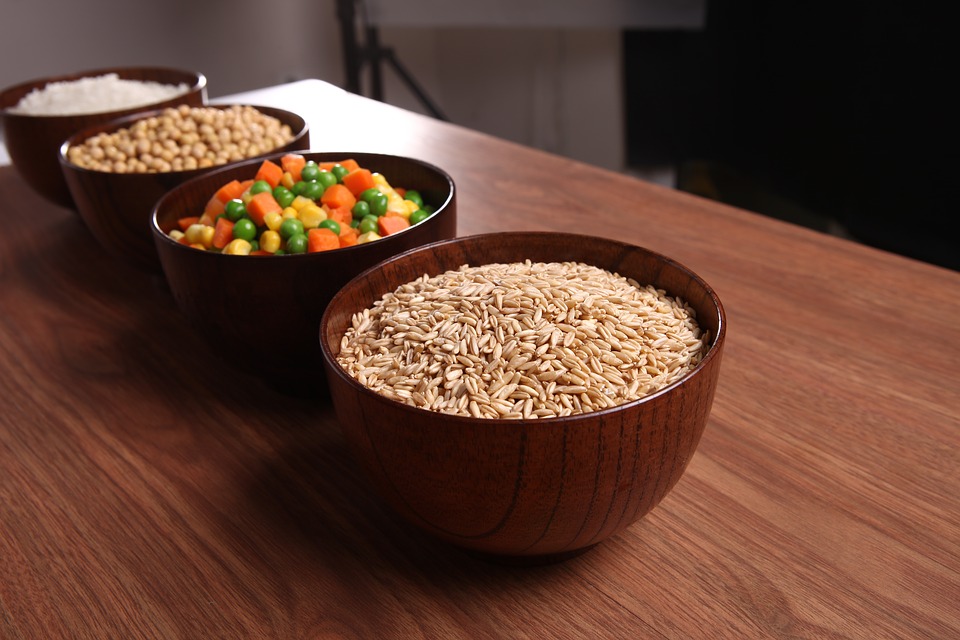Carbohydrates are not the enemy–they’re good for us!
There’s a common misconception that carbohydrates make us fat.
Well…that depends.
When people gain weight, they tend to blame carbohydrates and those attempting to lose weight will often “CUT THE CARBS!”
And the meat lovers are smiling!

But, there’s more to the issue of carbs versus meat…
Let’s take a look at carbohydrates. What are they?
Carbohydrates are an essential nutrient for our bodies. Carbs are our primary energy source and are packed with vitamins, minerals and fiber (because our best sources of carbohydrates are fruits, vegetables, and whole grains–and these foods have multiple health benefits). We need healthy carbs on a daily basis. There are three types of carbohydrates: sugar, starch and fiber.
- Sugar (simple carbohydrates)–I discussed sugar in detail on last week’s wellness blog. Sugar occurs naturally in fruits, milk, honey, and vegetables. This natural sugar isn’t so bad for us, in moderate quantities. It’s the added sugar (sweetened cereal, sweetened sodas and juices, desserts, pastry, ice cream, etc) that we should avoid as much as possible. Simple sugar is digested quickly and rapidly absorbed into the bloodstream.
- Starches (bonded sugar) are classified as complex carbohydrates. Starches are broken down and absorbed less quickly and provide longer lasting energy. Legumes (beans, peas), rice, and grains are good, healthy sources of starches. Like sugar, starches are broken down and absorbed into the bloodstream as glucose. Glucose provides our body with energy for all our bodily functions (activity, rest, breathing–everything our body does).
- Fiber (also complex carbohydrates)–Fiber is so important for us, I will focus on its benefits in a future blog.
Benefits of carbohydrates:
- Carbs provide us with energy for daily living. Carbs are our body’s first choice for energy.
- Healthy carbs, rich in fiber, help prevent obesity, type-2 diabetes, and heart disease.
- Complex carbohydrates (fruits, veggies, and whole grains) can help in healthy weight management. They are more filling. High sugar foods are digested quickly, allowing us to be hungry again, too soon–thus we eat more.
The problem with carbohydrates (there’s always a catch isn’t there?) is that if we eat too many of them, the excess glucose is stored in our body for later use. If not used, the glucose is converted to fat.
Ouch!
But, that shouldn’t turn us off carbs. Any food that we eat in excess is eventually stored as fat if our body doesn’t need it for our basic functions.
We don’t get fat just from carbohydrates. If we gain weight, it’s from an imbalance of caloric intake and caloric expenditure.
In other words, if we aren’t active enough to use all the calories we consume, the excess is stored, and the pounds add up.
BUT…not all carbohydrates are created equal…

What? Not equal?
How do we know which carbohydrates to eat?
- We should go for fresh or frozen fruits and vegetables without added sugar. If canned veggies are used, select those with low sodium content. Limit consumption of white potatoes and white rice and when possible, choose whole grain options for rice and pasta.
- Choose whole grains. Refining of grains (such as white bread) strips out part of the grain, along with some nutrients and fiber. Whole grains have more B vitamins. Try to select whole grains for at least half (or more) of your consumption of bread, rice, pasta, cereal, etc.
- Select low-fat dairy products. Beware of added sugar!
- Eat more legumes–beans, peas, and lentils. Legumes are high in complex carbs, low in fat, and high in folate, potassium, iron, and magnesium, and are good sources of fiber. Since legumes are a healthy source of protein, they are a good substitute for meat (which is higher in saturated fat and cholesterol).
- Limit added sugar as much as possible to less than 10% of our daily calories. For a 2000 calorie diet, that’s 200 calories of sugar (one soda has about 150 calories).

How many carbohydrates should we eat each day?
Many medical and nutrition experts encourage higher consumption of healthy carbohydrate (fruits, vegetables, whole grain, and low fat dairy) than the average American diet is currently eating. The Dietary Guidelines for Americans recommends that carbohydrates make up 45 to 65% of our daily calories. For a 2,000 calorie daily intake, 900 to 1,3000 calories would be from carbohydrates (choose healthy carbs!) This translates to 225 to 325 grams of carbs each day. The United States Department of Agriculture Food Guide Plan has long recommended that more than 50% of our diet should come from healthy carbohydrates.

This seems like a lot of carbohydrates, but the key is making healthy choices!
When I was reviewing research for this post, I came across some new claims about the benefits of carbohydrates. Eatingwell.com, in addition to confirming the nutritional benefits of carbs, asserts that carbohydrates can help boost our mood and keep our memories sharp. A comparison of research subjects that were on high carb and low carb diets showed that those eating the recommended amount of carbs had less depression, anxiety and anger than those on low carb diets. It will be interesting to see what new research shows us about these possible benefits.
So, what about these low carb diets and the benefits that supposedly result from cutting carbs? We’ll talk about that next week.
Wishing you healthy eating, my friends!
Additional sources:
www.mayoclinic.org
www.med-health.net
www.eatingwell.com
www.choosemyplate.gov